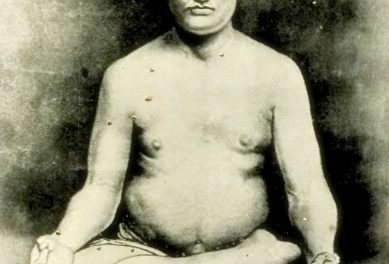Is it possible for heaven to be like a city and God to be like seven lamps of fire?
Those sentences which are colored in orange are from Maharishi Dayananda Saraswati book Satyarth Prakash (The Light of Truth) and those which are colored in black are Jerry Thomas’s response.
"And they had on their heads, crowns of gold…And there were seven lamps of fire burning before the throne which are the seven Spirits of God. And before the throne there was a sea of glass like unto crystal……and round about the throne, were four beasts full of eyes before and behind." (4:4 – 6.)
C. Now, is not the Christian heaven like a city and their God like a lamp of fire. Wearing of crowns of gold and other jewelry as well as the existence of such beasts as had 'eyes before and behind' is impossible. Besides, these beasts are said to have been lions, etc., now who can believe such things?
Answer: As mentioned in the Introduction to the Revelation and Figurative Language of Prophetical Writings article, I will be giving the interpretation of this passage which in itself is answer to the erroneous understanding of the text.
Crown of Gold: Crown signifies that they are rulers and gold signifies as the Holy Bible elsewhere alluded to the work that endures (1 Corinthians 3:12).
Seven lamps of fire burning before the throne which are the seven spirits of God again is an allusion to the perfection of God. Are these also allusions? The Holy Bible teaches so.
In Exodus 25:9 we are told that the earthly tabernacle is as per the Heavenly tabernacle. Further, we are told in Exodus 25, that there were seven lamps in the earthly tabernacle as per the pattern in Heavenly tabernacle.
Exodus 25:37-40 You shall make seven lamps for it, and they shall arrange its lamps so that they give light in front of it. And its wick-trimmers and their trays [shall be] of pure gold. It shall be made of a talent of pure gold, with all these utensils. And see to it that you make [them] according to the pattern which was shown you on the mountain.
The inspired author of Hebrews makes it very clear that these are symbolic of things that are present.
In Hebrews 9: 9-10 “It was symbolic for the present time in which both gifts and sacrifices are offered which cannot make him who performed the service perfect in regard to the conscience concerned only with foods and drinks, various washings, and fleshly ordinances imposed until the time of reformation.”
What is the meaning of it?
John Gill writes in his commentary of Revelation: in allusion to the seven lamps in the tabernacle and temple, which were trimmed by the priests, and always kept burning, and are expressive of the Spirit, and his gifts; and these being signified by the number "seven", denote the fulness and perfection of them; and being said to be "before the throne", show that there is always a sufficiency of them for the supply of the churches in all ages, to fit and qualify proper persons to minister the word, and administer ordinances; and these being called "lamps of burning fire", point at the light the Spirit of God in his gifts communicates to the churches; and that warmth and heat, comfort and refreshment; conveyed to them, through the preaching of the Gospel, and the dispensation of the ordinances of it, under his illuminating and quickening influences.
What about the beasts which are better retendered as living creatures?
They are definitely symbolic of human beings as elsewhere in the revelation human beings are symbolically represented by living creatures. These are definitely human beings are they are said to be redeemed by the blood of the lamp (Revelation 5:8-11). So who are these and what do their eyes represent?
John Gill writes:
“By these four living creatures, I apprehend, we are to understand the ministers of the Gospel in general, in the successive ages of the church, to whom all the characters do well agree. And though they may not be all found in everyone, at least not in all alike, yet thou are in one or another of them, and in them as together considered. They are said to be "four", being fewer in number than the members of the church, which are signified by the twenty four elders, and yet a sufficient number; and in allusion to the four standards of the camp of Israel in the wilderness, to which there seems to be some reference in the whole of this account; as the tabernacle there was placed in the midst, so the throne of God here; as the priests and Levites were round about that, so the four and twenty elders here; as there were seven lamps, over against the candlestick in the tabernacle, continually burning, so there are seven spirits here before the throne; and as there were four princes, who were standard bearers, placed at the four corners of the camp, so here four living creatures, or ministers of the word, who are standard bearers: the standard of Judah, with Issachar and Zabulon under him, was at the east of the tabernacle; and Ephraim, with Manasseh and Benjamin, at the west; Reuben, with Simeon and Gad, at the south; and Dan, with Asher and Naphtali, at the north; and the Jewish writers say F21, that on Judah's standard was the figure of a lion, on Ephraim's the figure of an ox, on Reuben's the figure of a man, and on Dan's the figure of an eagle; and to which the four living creatures are likened here. And this number "four" may be the rather mentioned, with respect to the four parts of the world, and corners of the earth, whither the ministers of the Gospel are sent to preach, and whither their commission reaches; there being of the elect of God in all parts to be gathered in by their ministry: and very properly may they be called "living creatures", because they are alive in themselves, being quickened by the Spirit of God; or otherwise they would not be fit for their work; and because their work requires liveliness in the exercise of grace, and fervency in the performance of duty: and because they are a means in the hand of God of quickening dead sinners, and of reviving drooping saints by the word of life, which they hold forth: the situation of these four living creatures agrees with them, who are said to be both in the midst of, and round about the throne, and so were nearer to it than the four and twenty elders, and were between that and them; as the ministers of the Gospel are set in the first place in the church; have nearness to God, and much of his presence, which is particularly promised them; and stand between God and the people, and receive from the one, and communicate to the other, and lead on the worship of God, as these four do; see (Revelation 4:9,10) . And these are said to be full of eyes; of spiritual light, and evangelical knowledge; and they have need of all the eyes they have to look into the Scriptures of truth, to search and pry into them, and find out the sense and meaning of them; to overlook the flock committed to them, they have taken the oversight of; to look to themselves, their d
octrine, and their conversation; to espy enemies and dangers, and give notice of them to the churches; to look to God upon the throne, and to the Lamb in the midst of it, for fresh supplies of gifts and grace; and to see to it, that all their ministrations tend to the glory of God, the honour of a Redeemer, and the good of souls. And they had eyes before and behind; "before" them, to look to the word of God, and the deep things in it, which continually lies before them, and to the things that are yet to come relating to the kingdom and church of Christ; and "behind" them, to observe how all sacrifices and types, predictions and promises, have had their accomplishment in Christ; they have eyes before them to watch over the church they are in the midst of, and which is the flock that is before them; and eyes behind, to guard against Satan and his emissaries, false teachers, who sometimes slyly and secretly come upon the back of them; they have eyes before them, to look to him that sits upon the throne, on whom their dependence, and from whom their expectations are; and they have eyes behind them, to look on the four and twenty elders, the members of the churches, to whom they minister.”
Thus we see that Maharishi missed on the symbolic language of the prophetical book and critiqued it without knowing the science of interpretation





